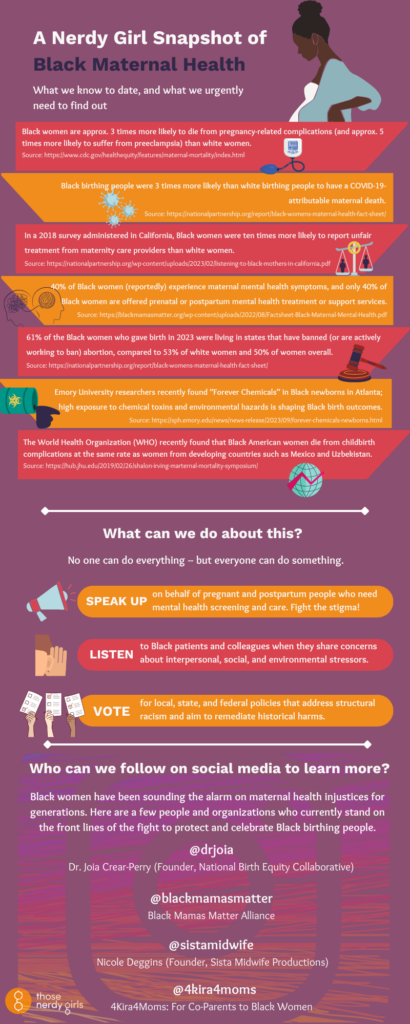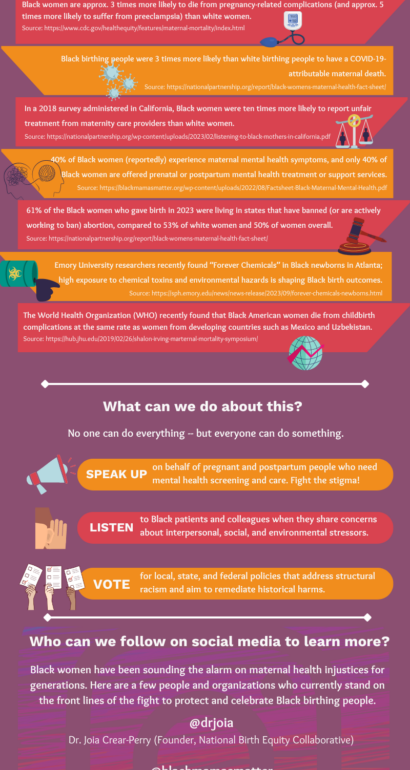What do we need to know about Black Maternal Health?
During pregnancy, childbirth, or the first 42 days after delivery of a living child, Black people are dying at almost three times the rate (CDC, 2021) as white people. More than 80% of pregnancy-related deaths are preventable (CDC, 2022)
After the initial feelings of disbelief, dismay, and downright heartbreak at such statistics related to the deaths of our fellow community members, we, as public health scientists, and you, our public health savvy readers, have to dig into that part of our brains that asks, “Why?” We have to get curious.
Why is this happening? And what can we do?
There is no one answer to why this is happening. Many factors play a role:
- Inequitable (unfair or uneven) access to quality healthcare. We see this in what’s called the Social Determinants of Health (SDOH): the non-medical factors that influence health outcomes. They are the conditions in which we are born, grow, work, live, and age, etc. (e.g., how far away is the prenatal care, what is the access to transportation, is there childcare for older children, how/where/to whom is health information being distributed, etc.)
- Structural racism (the ways in which societies promote and protect racial discrimination through mutually reinforcing systems of housing, education, employment, earnings, benefits, credit, media, health care, and criminal justice. AMA, 2021)
- Implicit bias (unconscious, and yes, we all have it. Here are some examples in health care: Non-white patients receive fewer cardiovascular interventions and fewer renal transplants; Black patients are more likely to die after being diagnosed with breast cancer; non-white patients are less likely to be prescribed pain medications (non-narcotic and narcotic); Black patients are less likely to receive chemotherapy and radiation therapy for prostate cancer and more likely to have testicle(s) removed (The Joint Commission, 2016)
- Under or improperly treated chronic conditions (related to all of the above)
- Weathering: the health effects of stress and discrimination. Weathering can impact pregnancy and post-partum outcomes. A 2021 review of existing data found that perceived racial discrimination is associated with high blood pressure. Ongoing high blood pressure, when combined with high lifetime stress, dramatically increases the risk of preeclampsia, one of the pregnancy and postpartum conditions that is killing Black people at higher rates than white people (The risk of dying of eclampsia and preeclampsia is about five times greater for Black people than for white people. US Preventive Services Task Force) We will be writing on weathering more soon!
Of note, research shows that Black people with higher levels of education and income are still at higher risk than white people with lower levels of both for having poorer outcomes related to life-threatening pregnancy and postpartum complications. It may be tempting for our brains to think that this shows a biological connection to race rather than a connection to systemic resource distribution and the epigenetic harms of racism over generations. The biology of racism (vs. the biology of race [a fallacy]) is an important topic that Those Nerdy Girls will cover soon. In the meantime, check out this article to learn more.
What can we do?
Even if we do not work in the health sciences or in the medical field, there are things we can do. As individuals in communities, we can look around at our resources and get curious.
- Does everyone in our community have the same level of access to food that supports a healthy pregnancy? Why? Why not?
- Is everyone in our community able to get to healthcare appointments, including mental health appointments? If not, what are the barriers?
- Does everyone in our community have access to a safe outside space in which to move and play?
- Are we supporting local, state, and national leaders who think health equity matters?
- Are we able to take on any leadership roles that may address some of these issues?
- Consider examining your own implicit bias and come up with a list of things you can do to counteract it.
What are some ways you can think of in your sphere that you can have an impact on this public health issue? Maybe just starting with sharing this post?!
And if you are pregnant or newly postpartum OR in a community with folks who are, here are some ways that the CDC suggested this week that you can stay safe:
- Talk to a healthcare practitioner if anything doesn’t feel right or is concerning to you or your loved one. See our recent post on how to prepare for a medical visit.
- Seek immediate care if you experience any of these pregnancy and postpartum warning signs: severe headache, extreme swelling of hands or face, trouble breathing, heavy vaginal bleeding or discharge, overwhelming tiredness. These could be life-threatening. See our post on preeclampsia.
- Share recent pregnancy history during each medical care visit for up to one year after delivery.
- Connect with healthcare and social support systems before, during, and after pregnancy. See resources for Black mamas, pregnant people, and their advocates here.
Stay safe, stay well, stay curious.
Those Nerdy Girls &+

References:
Working Together to Reduce Black Maternal Mortality
Pregnancy-Related Deaths: Data from Maternal Mortality Review Committees in 36 US States, 2017–2019
A Critical Review on the Use of Race in Understanding Racial Disparities in Preeclampsia
Hypertensive Disorders of Pregnancy: Screening
Racial Disparities in Maternal and Infant Health: Current Status and Efforts to Address Them
Race Is Real, But It’s Not Genetic
Link to Original FB Post



